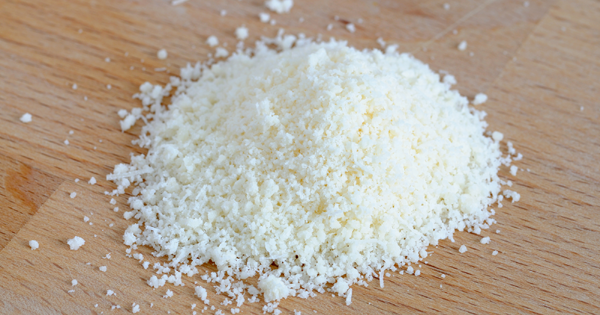If you’re a diehard pasta fan, chances are you like to top off the plate with a few sprinkles of delicious parmesan cheese.
But before you start making dinner plans tonight, take a look in your fridge. What kind of parmesan cheese are you using?
Unless you splurge on a container of freshly grated parmesan, it’s time to take a second look at those ingredients.
As it turns out, the U.S. Food and Drug Administration recently discovered that Castle Cheese Inc. has been selling its “100 percent real parmesan” with cheap fillers.
What kind of fillers, you ask? Probably not the kind you’d ever imagine eating.
While some companies have been caught substituting pricey parmesan with cheaper cheeses, like cheddar, others actually use cellulose, an anti-clumping agent made from wood pulp.
That’s right—wood pulp may be hiding in your cheese!
Castle President Michelle Myrter is scheduled to plead guilty later this month to criminal charges related to the sneaky swap, but Castle Cheese is just one of many guilty companies.
In fact, most of those tin containers of parmesan cheese that you can find in the non-refrigerated aisle are questionable.
Experts over at Bloomberg Business recently conducted their own study to find out which brands are lying about the amount of cellulose in their parmesan:
"Essential Everyday 100% Grated Parmesan Cheese, from Jewel-Osco, was 8.8 percent cellulose, while Wal-Mart Stores Inc.’s Great Value 100% Grated Parmesan Cheese registered 7.8 percent, according to test results. Whole Foods 365 brand didn’t list cellulose as an ingredient on the label, but still tested at 0.3 percent. Kraft had 3.8 percent."
It’s important to note that cellulose in general is neither harmful nor unhealthy for your body; it typically passes through your GI tract without being absorbed.
However, if companies are saying their cheese contains less cellulose than what’s really in there, just to cut corners, it is illegal.
The bottom line here is that you should always check the ingredients on the label of anything you buy before taking it home.
At the end of the day, the easiest way to ensure your family’s parmesan cheese really is just that, then try grating your own block at home!





